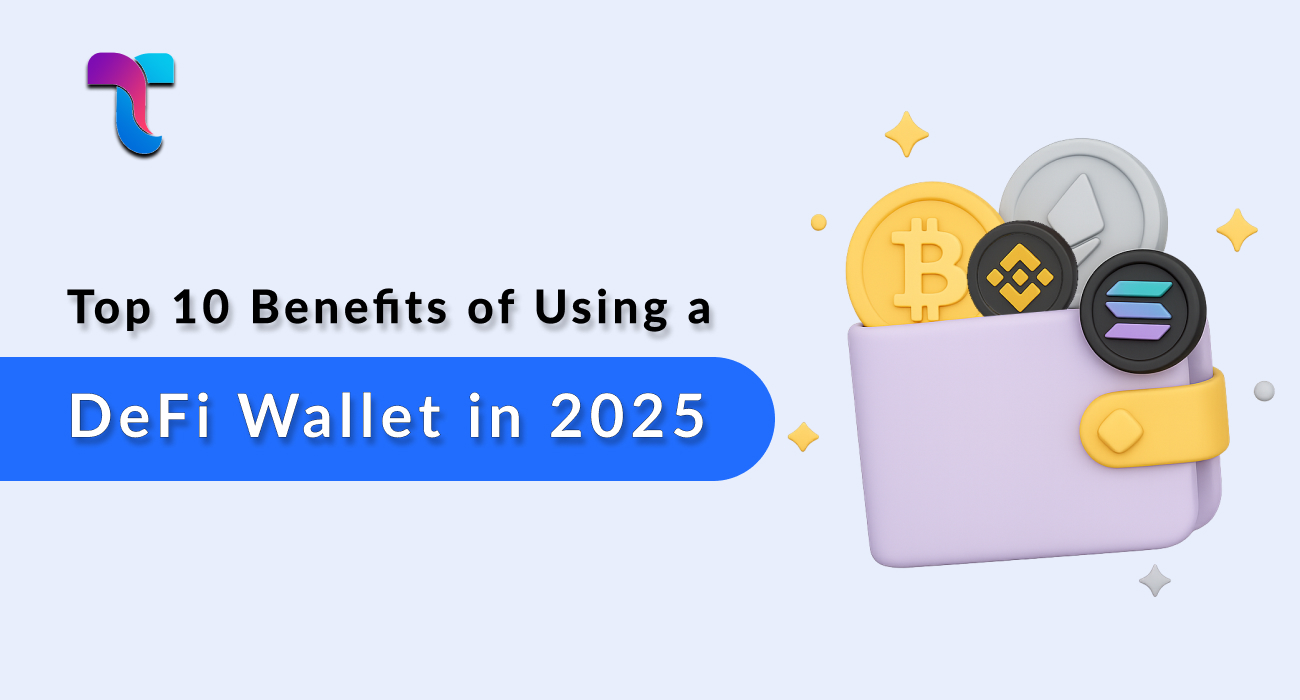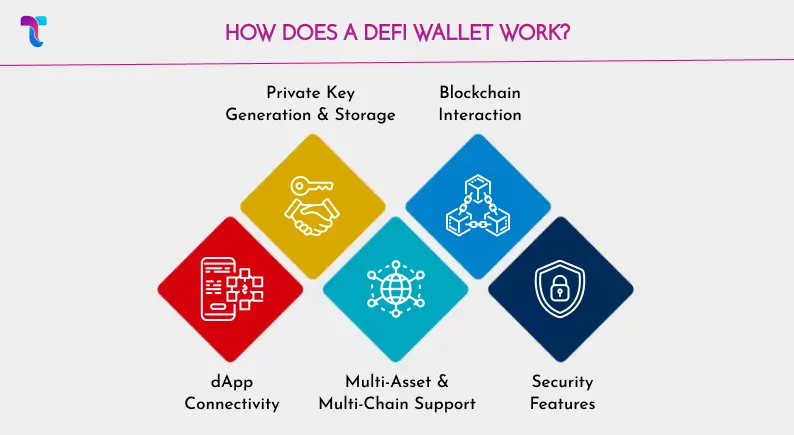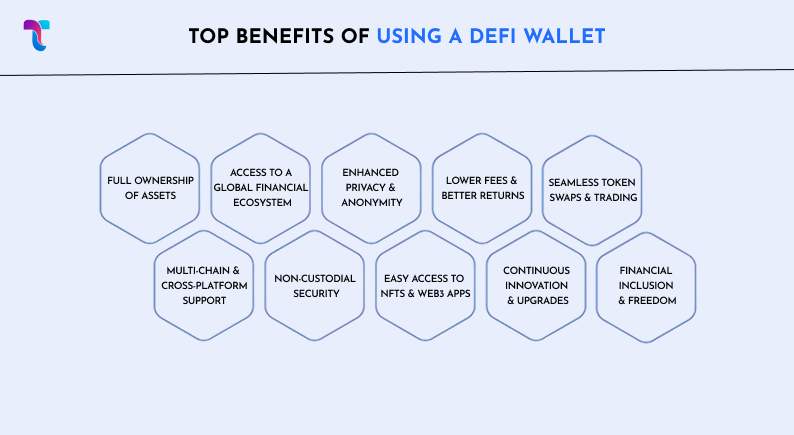Table of Contents
Did you know the global DeFi market is valued at USD 51.22 billion in 2025 and is projected to reach USD 78.49 billion by 2030. It is advancing at an 8.96% CAGR.
That’s more than just hype! It is a sign that DeFi (decentralized finance) is solidifying its place in today’s financial ecosystem.
So, what’s all the buzz about DeFi wallets in 2026? These nifty tools are doing more than just holding your crypto. From seamless swaps and yield farming to cross-chain convenience, they are helping you take control of your money like never before.
Are you looking to learn more about DeFi wallets? Here’s a blog for you!
In this blog, we’ll talk about the top benefits of using a DeFi wallet today. Let’s talk about it in detail!
What is a DeFi Wallet?
A DeFi wallet, synonymous with a Decentralized Finance wallet, is a digital tool that allows users to securely store, manage, and interact with cryptocurrencies and dApps without relying on centralized intermediaries such as banks or custodial services.
Unlike traditional crypto wallets that were managed by centralized exchanges, DeFi wallets give users full control over their private keys and assets. This self-custodial nature is a defining characteristic of DeFi, which ensures that only the wallet owner can authorize transactions.
DeFi wallets typically support a wide range of blockchain networks, such as Ethereum, Binance Smart Chain, and Polygon. This allows users to engage in activities like lending, borrowing, staking, yield farming, and trading directly from the wallet.
How Does a DeFi Wallet Work?
A DeFi wallet operates on the principle of self-custody. This means that users hold the private keys that control their digital assets. It enables secure, permissionless access to decentralized finance services.
Here’s how a DeFi wallet functions:
Private Key Generation & Storage
When you create a DeFi wallet, it generates a pair of cryptographic keys:
- A public key (that is, your wallet address) is used to receive assets.
- A private key or seed phrase is used to access and manage those assets.
Blockchain Interaction
DeFi wallets are designed to interact directly with blockchain networks. When you send funds, stake tokens, or interact with a smart contract, your wallet signs and broadcasts the transaction to the blockchain for verification.
dApp Connectivity
Modern DeFi wallets connect easily to decentralized applications through Web3 protocols. With just a click, users can connect their wallet to lending platforms, decentralized exchanges (DEXs), or NFT marketplaces, without creating separate accounts or undergoing KYC procedures.
Multi-Asset & Multi-Chain Support
Many DeFi wallets today support multiple assets across different blockchain networks. This allows users to manage a diverse portfolio and interact with various DeFi ecosystems from a single interface.
Security Features
Advanced DeFi wallets offer features like:
- Biometric authentication
- Hardware wallet integration
- Transaction previews
Top Benefits of Using a DeFi Wallet
DeFi wallets come with a wide range of compelling advantages, such as:
Full Ownership of Assets
A DeFi wallet gives you full control of your digital assets by storing your private keys securely. This means no centralized platform or third party can freeze, manage, or access your funds without your permission. You are the sole custodian of your money, which gives you the freedom to transact anytime. This level of ownership gives users complete independence and mitigates the risks associated with custodial wallets or platform failures.
Access to a Global Financial Ecosystem
DeFi wallets allow users to access dApps, which provide services like lending, borrowing, and trading, without needing a bank. With just an internet connection and a wallet, you can participate in the global financial system 24/7. This borderless access removes financial barriers, which makes it easier for individuals in underbanked regions or developing economies to take part in financial services that were once out of reach.
Enhanced Privacy & Anonymity
Unlike centralized exchanges that require identity verification, most DeFi-based wallets allow you to operate anonymously. You don’t need to submit documents or share personal information to use DeFi platforms. This provides greater privacy and protection from potential data breaches, identity theft, or regulatory overreach. You maintain full control over your identity while enjoying access to financial tools, which offers a more private alternative to centralized financial systems.
Lower Fees & Better Returns
DeFi wallets let you interact directly with smart contracts, which eliminates the need for intermediaries like banks and brokers. This reduces transaction and service fees. Additionally, users can earn higher yields through decentralized staking, lending, or liquidity mining. Compared to traditional finance, DeFi provides better returns, which makes it a better option for both passive income and portfolio growth.
Seamless Token Swaps & Trading
Most of the DeFi wallets integrate with decentralized exchanges, which allows users to swap tokens instantly within the app. There is no need to transfer funds to an exchange or wait for approval, as trades are processed directly through smart contracts. This makes token trading faster, cheaper, and more effective. Also, it is a more secure and convenient method for everyday crypto trading.
Multi-Chain & Cross-Platform Support
Modern DeFi wallets support multiple blockchain networks, such as Ethereum, BNB Chain, Polygon, and Solana. This allows users to manage a diverse portfolio in one place. This flexibility enables seamless access to DeFi protocols across chains without switching wallets. Thus, a cross-chain DeFi wallet is preferred, which simplifies asset transfers between networks.
Read Also: How to choose a Multi-Currency Crypto Wallet?
Non-Custodial Security
Security is one of the top benefits of DeFi wallets. Because they are custodial, this removes the risk of centralized hacks or account lockouts that can occur on custodial exchanges. Your funds are stored on-chain and accessed only through your wallet. As long as you manage your private keys safely, your assets remain secure. This minimizes single points of failure.
Easy Access to NFTs & Web3 Apps
DeFi wallets support NFTs and provide direct access to Web3 applications such as games, marketplaces, and metaverse platforms. You can buy, sell, or trade digital collectibles, manage in-game assets, and connect to NFT platforms. This convenience allows users to explore the broader blockchain ecosystem from one interface.
Continuous Innovation & Upgrades
Today, DeFi wallets are constantly evolving to include new features that help improve usability, performance, and security. In 2026, many DeFi wallets will offer gas fees, AI transaction suggestions, and built-in access to liquidity. By using a DeFi wallet, you stay connected to the blockchain technology and gain access to the latest tools, integrations, and market opportunities.
Financial Inclusion & Freedom
Anyone with a smartphone and internet connection can create a wallet and access a wide range of financial services, irrespective of location, income, or banking status. This opens doors for millions of people in underbanked or economically restricted regions, and gives them a chance to save, invest, and grow wealth independently.
Tips to Choose the Right DeFi Wallet in 2026
In 2026, there’s no one-size-fits-all solution; thus, you need to consider several factors before choosing a DeFi wallet. Those include:
Prioritize Self-Custody & Security
When choosing from a pool of the top DeFi wallets, your top priority should be security and full control of your digital assets. A reliable wallet allows you to manage your private keys, which are the only way to access your funds.
You must look for wallets with features like biometric login, encryption, and compatibility with hardware wallets. Choosing a self-custody crypto wallet ensures that no third party can access your assets without your permission.
Look for Multi-Chain & Token Support
The best DeFi wallet supports multiple blockchains like Ethereum, BNB Chain, Polygon, and Solana. This flexibility allows you to access a wider range of DeFi apps, NFTs, and services.
Choosing a wallet with multi-chain support means you won’t need to download separate apps for each network, which makes it much easier to manage your assets and avoid technical headaches.
Choose a Wallet with a Good UI
Good UI is one of the best DeFi wallet features, especially if you are new to DeFi. The right wallet should be easy to navigate, with clear instructions, clean visuals, and simple ways to send, receive, or stake your assets.
Some wallets even offer both beginner and advanced modes so you can grow your knowledge over time. A wallet that is user-friendly makes your day-to-day crypto management easy.
Check dApp Integration & Web3 Compatibility
One of the biggest benefits of a DeFi wallet is its ability to connect directly with dApps. These apps let you lend crypto, trade on decentralized exchanges, buy NFTs, and more.
Other than that, it must offer fast, secure Web3 integration, which means you can connect to dApps without creating extra accounts.
Ensure Reliable Backup Options
Losing access to your DeFi wallet can mean losing your funds permanently, so backup options are essential. The wallet you choose should provide a secure way to store your recovery phrase.
Some wallets also offer cloud backup with encryption or social recovery features. These options help protect you from accidental loss while still keeping your private keys secure and under your control.
Look for Built-in DeFi Features
You must look for wallets that let you swap tokens, stake assets, track your yield, and even bridge between blockchains. These features can save time and reduce risks from moving funds between different platforms.
Especially if you are actively participating in DeFi, a wallet with integrated tools can offer a smoother and more efficient experience without needing to switch between multiple services.
Choose a Wallet with Ongoing Support
The DeFi space evolves quickly; thus, it is important to use a wallet that is regularly updated by an active team. You must check if the wallet you are choosing has frequent software updates, security patches, and responsive customer support.
Also, look for community engagement as strong feedback from users often indicates a trustworthy platform. Wallets that keep up with the latest trends and tech are less likely to have bugs or vulnerabilities.
Wrapping Up
That brings us to the end of this blog!
By now, you must have guessed that DeFi crypto wallets are a promising investment option today. They play an important role in the DeFi landscape, and the earlier you step into this niche, the easier it will be to attract newbies.
So, are you looking to develop one? That’s where we, Technoloader, step in!
Being a leader in the field, we deliver high-quality solutions according to each client’s specific needs and goals. With 7+ years of experience, we have a proven track record in successfully implementing projects across diverse industries.
Connect with our team of experts and let’s bring your DeFi wallet vision to life!
 +91 7014607737
+91 7014607737
 info@technoloader.com
info@technoloader.com





